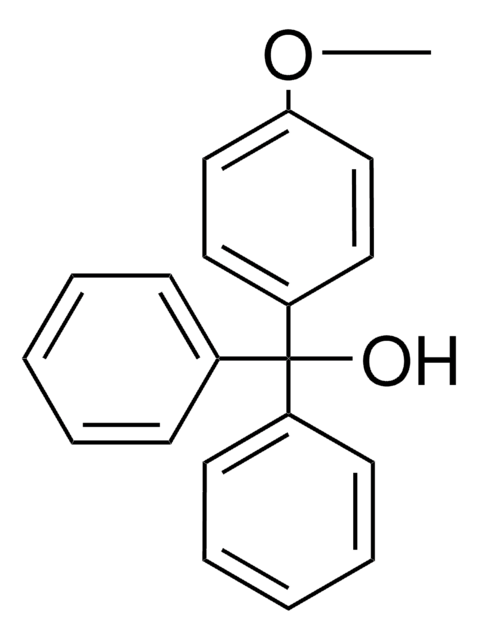414247
2-Methyltetrahydrofuran
BioRenewable, anhydrous, ≥99.0%, contains 250 ppm BHT as stabilizer
Synonym(s):
2-MeTHF, Tetrahydro-2-methylfuran, Tetrahydrosilvan
About This Item
Recommended Products
grade
anhydrous
Quality Level
Assay
≥99.0%
form
liquid
contains
250 ppm BHT as stabilizer
expl. lim.
0.34-6.3 %
greener alternative product characteristics
Safer Solvents and Auxiliaries
Use of Renewable Feedstocks
Learn more about the Principles of Green Chemistry.
sustainability
Greener Alternative Product
impurities
<0.002% water
<0.005% water (100 mL pkg)
evapn. residue
<0.0003%
refractive index
n20/D 1.406 (lit.)
bp
78-80 °C (lit.)
mp
-136 °C
density
0.86 g/mL at 25 °C (lit.)
greener alternative category
SMILES string
CC1CCCO1
InChI
1S/C5H10O/c1-5-3-2-4-6-5/h5H,2-4H2,1H3
InChI key
JWUJQDFVADABEY-UHFFFAOYSA-N
Looking for similar products? Visit Product Comparison Guide
General description
2-Methyltetrahydrofuran (2-MTHF), a 2-methyl substituted tetrahdrofuran, is a biomass derived solvent. It is a potential greener solvent alternative for organic synthesis. It shows resistance to reduction by lithium making it a promising candidate as electrolytes in lithium batteries. Its polarity and Lewis base strength is intermediate between tetrahydrofuran (THF) and diethyl ether. The ring opening reaction of 2-MTHF has been studied using acid chloride and iodide to form secondary chlorides and primary iodides respectively. On long term storage, tetrahydrofuran forms organic peroxides. This process can be suppressed by adding butylated hydroxytoluene (BHT) as a stabilizer. BHT removes the free radicals required for the peroxide formation.
Application
It may be used as an alternative solvent to:
- DMSO (dimethyl sulfoxide) or MTBE (methyl tertiary butyl ether) in the C-C bond forming reactions catalyzed by lyase enzyme.
- THF in the reaction between Grignard reagents and carbonyl compounds.
- Methylene chloride in some biphase reactions.
Organic Solar Cells
2-Methyltetrahydrofuran (2-MeTHF): A Biomass-Derived Solvent with Broad Application in Organic Chemistry
Features and Benefits
Packaging
Other Notes
Legal Information
Signal Word
Danger
Hazard Statements
Precautionary Statements
Hazard Classifications
Acute Tox. 4 Oral - Eye Dam. 1 - Flam. Liq. 2 - Skin Irrit. 2
Supplementary Hazards
Storage Class Code
3 - Flammable liquids
WGK
WGK 2
Flash Point(F)
14.0 °F - closed cup
Flash Point(C)
-10.0 °C - closed cup
Personal Protective Equipment
Choose from one of the most recent versions:
Already Own This Product?
Find documentation for the products that you have recently purchased in the Document Library.
Customers Also Viewed
Related Content
Why should you have to choose between solvents that are ecological and those that are reliable? Enjoy both at once with our biorenewable and greener solutions. Cyrene™ solvent is a new dipolar aprotic alternative to common REACH restricted solvents, such as N methyl-2-pyrrolidone (NMP) and Dimethylformamide (DMF).
Why should you have to choose between solvents that are ecological and those that are reliable? Enjoy both at once with our biorenewable and greener solutions. Cyrene™ solvent is a new dipolar aprotic alternative to common REACH restricted solvents, such as N methyl-2-pyrrolidone (NMP) and Dimethylformamide (DMF).
Why should you have to choose between solvents that are ecological and those that are reliable? Enjoy both at once with our biorenewable and greener solutions. Cyrene™ solvent is a new dipolar aprotic alternative to common REACH restricted solvents, such as N methyl-2-pyrrolidone (NMP) and Dimethylformamide (DMF).
Why should you have to choose between solvents that are ecological and those that are reliable? Enjoy both at once with our biorenewable and greener solutions. Cyrene™ solvent is a new dipolar aprotic alternative to common REACH restricted solvents, such as N methyl-2-pyrrolidone (NMP) and Dimethylformamide (DMF).
Our team of scientists has experience in all areas of research including Life Science, Material Science, Chemical Synthesis, Chromatography, Analytical and many others.
Contact Technical Service











